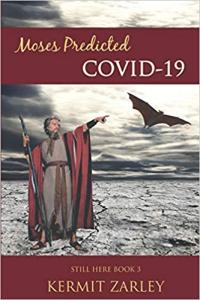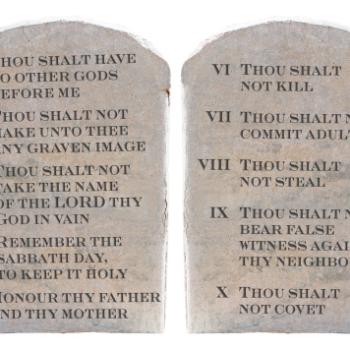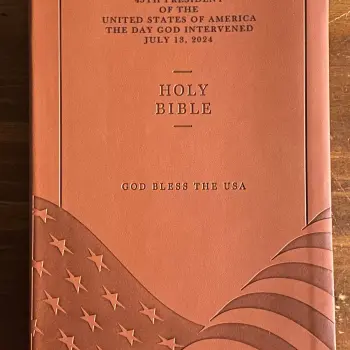I think whether or not Jesus abolished the Mosaic food laws, as set forth in Leviticus 11 and Deuteronomy 14 in the Jewish Bible (Old Testament), may be relevant to the deadly COVID-19 pandemic the world is now suffering. This virus is believed to have originated by a pathogen being transmitted from bats to humans and perhaps via an intermediate animal, such as a pangolin. I have been posting about this subject in this series. These biblical texts say God gave these food laws to Moses, and Moses then gave them to Israel. Scholars include these food laws in the wider concept of purity laws in the Torah (generally, the first five books of the Bible), which are mostly in Leviticus 11–19.
What these food laws say is that God divides animals into two categories that he calls “clean” and “unclean.” The clean animals he allows the Hebrews/Jews to eat, whereas the unclean animals he forbids them to eat. Plus, God even says that if a Hebrew/Jew touches an unclean dead animal, or that dead animal touches the clothing of a person, that person must wash his/her body and/or clothing and then isolate until evening before joining in community. I think this latter injunction especially indicates that God intends a hygienic character to these laws. That is, it suggests some of unclean animals carry many pathogens detrimental to human health. This is the case with the “bat.”
These two divine divisions of animals into clean and unclean are based on two factors: clean animals both divide the hoof and chew the cud whereas unclean animals do not. The laws then list some animals in both categories. Clean animals include calves, sheep, goats, and deer. Unclean animals include pigs, badgers, camels, and bats.
Bats have been the source of several virus epidemics in the past. Genetic sequencing has almost certainly proved that bats were the original source of COVID-19, the name of this coronavirus, but more particularly SARS-CoV-2. China’s government has said it was first contracted by a human or humans at the Huanan Seafood Wholesale Market in the megacity of Wuhan in China. (Huanan means “South China.”)
I believe humans should pay attention to these Mosaic food laws because of the possibility that they have hygienic value, but not that we all should eat completely kosher. These Mosaic food laws were given to Hebrew/Jews, and there is nothing in the Bible’s New Testament that says Gentile Christians must keep these laws. Most modern Bible scholars, however, have not believed the Mosaic food laws in Leviticus 11 and Deuteronomy 14 have any significance for human health.
Moreover, throughout the history of Christianity, most Christians have been taught that Jesus abolished these food laws established by Moses. The gospels of Matthew and Mark record an incident in which some Pharisees and scribes questioned Jesus about eating with unwashed hands. Mark explains that Jews “do not eat unless they thoroughly wash their hands, thus observing the tradition of the elders; and they do not eat anything from the market unless they wash it” (Mk 7.3-4 NRSV).
Mark then relates, “So the Pharisees and the scribes asked him [Jesus], ‘Why do your disciples not live according to the tradition of the elders, but eat with defiled hands?’ (Mk 7.5). Jesus’ answer gets pretty complicated because he cites an example in which they had wrongly interpreted another Mosaic law. He said by doing so they were “making void the word of God through your tradition that you have handed on. And you do many things like this” (v. 13). Jesus meant the same about their objection to eating food with unwashed hands.
Then we read, “When he [Jesus] had left the crowd and entered the house, his disciples asked him about the parable. He said to them, ‘Then do you also fail to understand? Do you not see that whatever goes into a person from outside cannot defile, since it enters, not the heart but the stomach, and goes out into the sewer?'” (Mk 7.17-19). Then the text in the NRSV adds this parenthetical sentence in v. 19b, “(Thus he declared all foods clean.)” This sentence appears in the Gospel of Mark but not in the Gospel of Matthew. Jesus then explained that it is evil that comes out of a person’s heart that defiles, and he gave several examples of it.
I was first taught by my pastor, a graduate of Dallas Theological Seminary, that Jesus abolished the Mosaic food laws during this episode recorded in Matthew 15.1-29 and Mark 7.1-23. In the two-volume The Bible Knowledge Commentary: An Exposition of the Scriptures by Dallas Seminary Faculty (1983), it says at Mk 7.19b, “The concluding sentence of verse 19 is an editorial comment by Mark . . . to emphasize the significance of Jesus’ statement for his Christian readers in Rome, some of whom may have been confused over Jewish food laws . . . He simply pointed out that Jesus declared all foods ‘clean’ for Christians. The early church was slow to grasp this truth (cf. Acts 10; 15 [sic and author’s emphasis]).” This interpretation ofMark 7.19b is common among biblical commentaries on the Gospel of Mark.
Likewise, the Old Testament volume of this Dallas Seminary commentary says at Deuteronomy 14.21, “in the New Testament God abolished the food laws of the Old Testament (Mark 7:14-23; Acts 10:9-23).” There are multiple problems with this interpretation of Mk 7.19b, which is shared by many Christian Bible teachers.
First, the main issue is that these Jews and Jesus were not talking about eating only meat mentioned in the Mosaic food laws, but all foods, thus likely grains and perhaps vegetables and fruit, with unwashed hands. To insert the concept that Jesus declared all animal meats “clean”–thus the previously “unclean” he now declares “clean”–is contrary to the context of this narrative. It is obvious that both the Pharisees and Jesus are assuming that the food the disciples ate was permitted by the Mosaic food laws. The Pharisees did not believe the food the disciples ate was unclean in itself; they believed the food was “unclean,” “common” (due to the LXX), or “defiled” because the disciples had touched and eaten it with unwashed, thus “defiled,” hands.
Jesus explained that eating food does not make people unclean, but sins that originate from the heart, the inner soul, is what makes them unclean. Then Jesus enumerates several sins that result. Mark has Jesus concluding, “All these evil things come from within, and they defile a person” (Mk 7.23). But Matthew has Jesus concluding, “These are what defile a person, but to eat with unwashed hands does not defile” (Mt 15.20). Mark does not include this last independent clause, just as Matthew does not include the Jesus’ dependent clause in Mk 7.19b–“Thus he declared all foods clean.”
Second, this dependent clause in Mk 7.19b in the NRSV translates panta ta bromata katharizon in the Greek text. Most English Bible versions render it as here, in the NRSV (e.g., NASB, NIV, ESV), in which it represents an explanatory comment by the author, Mark. But some English Bible versions do not translate it this way. Moreover, they treat it as words spoken by Jesus. For example, the KJV views it as the words of Jesus and translates it, “purging all meats.” It is rendered the same in the Greek-English New Testament. This means Jesus explained that all appropriate food that Jews eat with unwashed hands is still permitted by God.
The major English versions are inconsistent about what Jesus’ disciples ate. The Greek texts of both Mt 15.2 and Mk 7.2 reveal that the Pharisees said Jesus’ disciples did not eat their artos with unwashed hands. Artos means “bread” or “food” in general. But both the NRSV and ESV don’t even translate the artos in both texts, thus ignoring it. The NIV ignores it in Mt 15.2 and translates it “food” in Mk 7.2. The NASB translates it “bread” in both texts. The Greek word broma in Mk 7.19b means “food” or “meat.”
Third, this interpretation of Mk 7.19b is further affirmed by recognizing that these Jews had accused Jesus’ disciples of eating food with “defiled hands” because they had not washed them. Their accusation was that the food was defiled only because they ate it with defiled hands. That is what Jesus addresses with his answer, not that the food itself, whether eaten with washed hands or unwashed hands, was previously unclean, thus defiled.
Fourth, if Mk 7.19b is a parenthetical remark by Mark the author, and he means that Jesus thereby abolished the Mosaic food laws regarding unclean animals, declaring them clean as others, then this concept is more important than Jesus teaching therein that eating with unwashed hands does not defile the eater. Why? The former opposes the clear teaching of Moses, which was given to him by God and became holy scripture in Leviticus 11 an Deuteronomy 14, whereas the latter merely opposes the tradition of the elders. Jesus sometimes taught that the Pharisees, scribes, and/or elders got their teaching wrong according to Torah. Yet, the parallel account of Mark 7.1-23, which is Matthew 15.1-29, does not contain the clause we are considering in Mark 7.19b–“Thus he declared all foods clean.” This omission in Matthew strongly suggests that this clause was not important to the narrative, which further suggests that it does not mean Jesus abolished the Mosaic food laws.
According to this understanding, what Jesus said in Mk 7.19b has nothing to do with the Mosaic food laws of Leviticus 11 and Deuteronomy 14. Thus, the NRSV translation, and all others like it–“he declared all foods clean”–is misleading, as if Jesus abolished the Mosaic distinction between clean and unclean animals. That concept does not fit the context of what both Jesus and his interlocutors were talking about. That is, Jesus was opposing their tradition of eating with unwashed hands, not opposing Moses’ institution of food laws in which he declared some animals clean and others unclean.
Fifth, there is some evidence of early anti-Semitism in this interpretation that Jesus abolished the Mosaic food laws. The word “declared” in Mk 7.19b in the NRSV translates katharizon in the Greek text. Bruce Metzger, in his authoritative A Textual Commentary on the Greek New Testament (p. 95), relates that there is manuscript variance for this word in this text. This means the many ancient Greek manuscripts vary concerning what word is here. But Metzger reveals, “The overwhelming weight of manuscript evidence supports the reading katharizon. The difficulty of construing this word in the sentence prompted copyists to attempt various corrections and ameliorations.”
Moreover, Metzger also reveals in a footnote, here, “Many modern scholars, following the interpretation suggested by Origen and Chrysostom, regard katharizon as connected grammatically with legei in ver. 18, and take it as the evangelist’s comment on the implications of Jesus’ words concerning Jewish dietary laws.” John Chrysostom (c. 347-407) was called “Golden mouth” because he excelled all church fathers as a preacher. Yet of all patristic authors, Chrysostom was by far the most anti-Semitic. Church fathers were apt to choose an interpretation of a New Testament text that appeared anti-Semitic, as this one does, by opposing a unique Jewish tradition.














